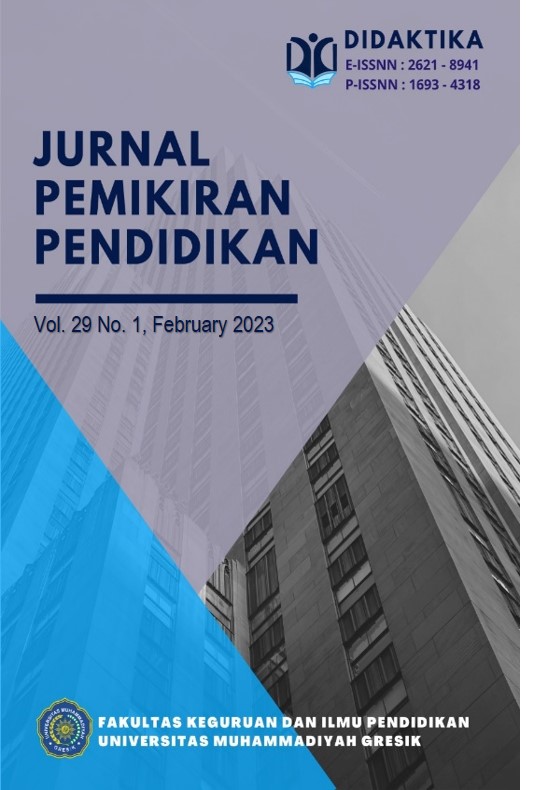Tantangan Lembaga Pendidikan Di Jepang Dalam Menyambut Era Society 5.0
DOI:
https://doi.org/10.30587/didaktika.v29i1.5252Keywords:
penyelenggara pendidikan; era Society 5.0; JepangAbstract
Era Society 5.0 or called Society 5.0 was first echoed by the Japanese government. This era is an era where drastic changes occur in the industrial world and social structure. Many things need to be prepared, one of which is preparing human resources capable of adapting to that era, the things that can be done for this is through education. Era Society 5.0 requires someone to be able to integrate their activities with digital technology. This article examines what challenges will be faced by educational institutions in Japan and what must be done to be able to form the human resources needed by the world of work in Japan in the era of Society 5.0. This research has the objective of describing what are the challenges of educational institutions in Japan to graduate human resources who are ready to compete in the era of society 5.0 and how to solve them. This research uses a qualitative research approach. The data collection technique was carried out by collecting literature data. This study collects information or data from various sources such as articles that are relevant to the issue of Education in Japan's Society 5.0 era. To face the era of Society 5.0, the world of education in Japan has carried out various corrective actions, including reforming education in the form of a lecture system and lecture materials, providing facilities for students and alumni to be able to discuss with companies in Japan, and establishing collaborations with foreign universities in the form of providing double degree programs.
References
Ezaki, H., Ueno, Y., & Ozawa, K. (2019). 「Society 5.0」における教育とは(3)~これからの社会におけ
る教育のあり方を考える~. 東京工芸大学工学部紀要. 人文・社会編 = The Academic Reports,
the Faculty of Engineering, Tokyo Polytechnic University, 36-43.
Irianto, Y. B. (2011). Kebijakan Pembaharuan Pendidikan. Konsep, Teori dan Model. Jakarta: Rajawali Pers.
Kaidanren. (2018, 12 4). 今後の採用と大学教育に関する提案. Retrieved from Kaidanren:
https://www.keidanren.or.jp/policy/2018/113_honbun.html#p3
Keidanren. (2016). Toward realization of the new economy and society. Retrieved from Keidanren:
https://www.keidanren.or.jp/en/policy/2016/029_outline.pdf
Keidanren. (2018, Desember 4). 今後の採用と大学教育に関する提案参考資料. Retrieved from
Keidanren: https://www.keidanren.or.jp/policy/2018/113_shiryo.pdf#page=2
Kuncie. (2022, Agustus 16). Kuncie. Retrieved from Kuncie:
https://www.kuncie.com/posts/pentingnya-skill-komunikasi
Octaria, D. (2017). KEMAMPUAN BERPIKIR LOGIS MAHASISWA PENDIDIKAN MATEMATIKA
UNIVERSITAS PGRI PALEMBANG PADA MATA KULIAH GEOMETRI ANALITIK. eJournal Universitas Islam Negeri Raden Fatah (UIN Raden Fatah Palembang), 181-194.
Qothrunnada, K. (2021, September 13). detikedu. Retrieved from Detik.com:
https://www.detik.com/edu/detikpedia/d-5721612/pengertian-tanggung-jawab-lengkapdengan-contoh-bentuk-dan-ciri-cirinya
Runisah. (2021). PEMBELAJARAN MATEMATIKA UNTUK MENGHADAPI ERA SOCIETY 5.0.
Euclid, 83-173.
Salengke, H. (2019). Angka Kelahiran Bayi Menurun, Pertumbuhan Ekonomi Jepang Terancam. Retrieved
from mediaindonesia.com: https://mediaindonesia.com/internasional/279753/angkakelahiran-bayi-menurun-pertumbuhan-ekonomi-jepang-terancam
Sugiyono. (2017). Metode Penelitian Kuantitatif, Kualitatif dan R&D. Bandung: Alfabeta.
Suherman, Musnaini, Wijoyo, H., & Indrawan, I. (2020). Industry 4.0 vs Society 5.0. Banyumas: Pena
Persada. Retrieved from researchgate.net.
Sutiarso, S. (2019). MENGEMBANGKAN POLA BERPIKIR MATEMATIS SISWA DI ERA SOCIETY
5.0. Seminar Nasional Pendidikan FKIP Unila, “Transformasi Pendidikan Abad 21 Menuju Society
5.0, 1-8.
Warohidah, A. R., & Kusuma, A. B. (2019). PERKEMBANGAN ERA REVOLUSI INDUSTRI 4.0
DALAM PEMBELAJARAN MATEMATIKA. Prosiding Sendika: Bidang Pendidikan Matematika.
World Economic Forum. (2020). The Future Jobs Report 2020. World Economic Forum.
Wulandari, T. (2022, Maret 18). detikedu. Retrieved from Detik.com:
https://www.detik.com/edu/detikpedia/d-5989447/pengertian-kreatif-ciri-ciri-dan-caramengembangkan-kreativitas
Yoshiaki, U., Yuka, S., & Kazuhito, O. (2021). AI 時代における教育 ~Society5.0 と SDGs の提言を踏ま
えて~. Tokyo: 東京工芸大学工学部紀要. 人文・社会編
Downloads
Published
How to Cite
Issue
Section
License
License and Copyright Agreement
In submitting the manuscript to the journal, the authors certify that:
- They are authorized by their co-authors to enter into these arrangements.
- The work described has not been formally published before, except in the form of an abstract or as part of a published lecture, review, thesis, or overlay journal.
- That it is not under consideration for publication elsewhere,
- That its publication has been approved by all the author(s) and by the responsible authorities – tacitly or explicitly – of the institutes where the work has been carried out.
- They secure the right to reproduce any material that has already been published or copyrighted elsewhere.
- They agree to the following license and copyright agreement.
Copyright
Authors who publish with DIDAKTIKA: Jurnal Pemikiran Pendidikan agree to the following terms:
- Authors retain copyright and grant the journal right of first publication with the work simultaneously licensed under a Creative Commons Attribution License (CC BY-SA 4.0) that allows others to share the work with an acknowledgment of the work's authorship and initial publication in this journal.
- Authors are able to enter into separate, additional contractual arrangements for the non-exclusive distribution of the journal's published version of the work (e.g., post it to an institutional repository or publish it in a book), with an acknowledgment of its initial publication in this journal.
- Authors are permitted and encouraged to post their work online (e.g., in institutional repositories or on their website) prior to and during the submission process, as it can lead to productive exchanges, as well as earlier and greater citation of published work.
Licensing for Data Publication
Open Data and Software Publishing and Sharing
The journal strives to maximize the replicability of the research published in it. Authors are thus required to share all data, code or protocols underlying the research reported in their articles. Exceptions are permitted but have to be justified in a written public statement accompanying the article.
Datasets and software should be deposited and permanently archived inappropriate, trusted, general, or domain-specific repositories (please consult http://service.re3data.org and/or software repositories such as GitHub, GitLab, Bioinformatics.org, or equivalent). The associated persistent identifiers (e.g. DOI, or others) of the dataset(s) must be included in the data or software resources section of the article. Reference(s) to datasets and software should also be included in the reference list of the article with DOIs (where available). Where no domain-specific data repository exists, authors should deposit their datasets in a general repository such as ZENODO, Dryad, Dataverse, or others.
Small data may also be published as data files or packages supplementary to a research article, however, the authors should prefer in all cases a deposition in data repositories.











